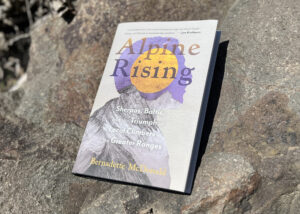This might be an overwhelming assumption, but I suspect that most of the women reading this page are — like me — free to make life choices based mostly on what we prefer. For example; I choose when (and if) I want to get married, what sports I want to do, and visit the places I fancy.
But this modern luxury isn’t the case for all women. Wafaa Amer, who was born in Egypt, didn’t have the privilege to make such decisions until she moved to Italy where the art of climbing liberated her entirely.

Wafaa Amer found freedom when she began climbing in Italy.
Until she was nine years old, Amer lived in a small village in Egypt where streets were unpaved and there was no electricity. She watched from behind windows, stuck indoors as her male cousins celebrated birthdays, or kicked a ball. Although she wanted to join them, she was brought up with the strict religious belief that those activities were not available to women.
Amer was acutely aware that her life instead was about getting married young, then devoting herself entirely to her husband’s wishes. But none of these things made any sense to her. Why should she be restricted because of her gender, she wondered?
“I was wondering if there was something wrong with me since I had different thoughts,” she said of wanting a lifestyle different to the world women around her were accustomed to.
When she eventually joined her parents in Italy, it shone a spotlight on a different lifestyle for girls. Although her father strictly forbade her from participating in sport, she could now see this wasn’t the case for all girls.
Throughout the world, just one country completely bans women from sporting activities, but there are many more cultures, religions, and ethnicities that create an alienating environment for women in exercise and sport. Amer wasn’t so much alienated as tormented by a sense of being imprisoned in her own life.
One day a friend introduced her to an indoor climbing wall, and her prison began to fade. “it was a very strong feeling,” Amer describes of that moment, “and that strong feeling pushed me to continue.”

For Amer, climbing is a dance of freedom.
In secret, she visited the climbing gym regularly and entered competitions where she achieved podium results.
“We didn’t have a lot of money, we were five people, and my father had to take care of all of us,” she said. “But my best friend, who was a climber already, wanted me to try that discipline and she gave me the membership card to the gym as a gift.”
When she turned 18, she left the family home to pursue climbing.
Going against her father’s wishes had serious consequences for Amer, but sacrificing family gave her freedom.
It took Amer two years to find a stable home and a job but the decision paid off. Her climbing skills have reached a level where she has become one of La Sportiva’s sponsored athletes. She’s also rekindled a relationship with her family, although an unexpected one by her father’s standards.
Amer is just 25 years old. If she had of remained in her pre-climbing reality, she’d probably have been married for eight years. In the year 2000, three percent of all Egyptian women married before the age of 15.
For Amer, climbing is a backdrop for something far more important: It is the art of reaching freedom, transcending judgments and prejudices.
“Freedom for me begins when I tie the knot on my harness,” she says. “It is finding myself again, it is thinking more deeply about what I would like to do and create.”
Hura — the title of this film — means “being free” in Egyptian.






